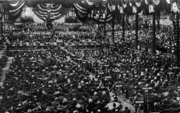
1900 Republican National Convention
Encyclopedia

Republican Party (United States)
The Republican Party is one of the two major contemporary political parties in the United States, along with the Democratic Party. Founded by anti-slavery expansion activists in 1854, it is often called the GOP . The party's platform generally reflects American conservatism in the U.S...
of the United States
United States
The United States of America is a federal constitutional republic comprising fifty states and a federal district...
was held June 19 to June 21 in the Exposition Auditorium, Philadelphia
Philadelphia, Pennsylvania
Philadelphia is the largest city in the Commonwealth of Pennsylvania and the county seat of Philadelphia County, with which it is coterminous. The city is located in the Northeastern United States along the Delaware and Schuylkill rivers. It is the fifth-most-populous city in the United States,...
, Pennsylvania
Pennsylvania
The Commonwealth of Pennsylvania is a U.S. state that is located in the Northeastern and Mid-Atlantic regions of the United States. The state borders Delaware and Maryland to the south, West Virginia to the southwest, Ohio to the west, New York and Ontario, Canada, to the north, and New Jersey to...
. The Exposition Auditorium was located south of the University of Pennsylvania
University of Pennsylvania
The University of Pennsylvania is a private, Ivy League university located in Philadelphia, Pennsylvania, United States. Penn is the fourth-oldest institution of higher education in the United States,Penn is the fourth-oldest using the founding dates claimed by each institution...
, and the later Convention Hall was constructed along the building's east wall. It was demolished in 2006.
Each state was allotted two delegates per electoral vote, and territories were granted from two to six delegates. Altogether, there were 926 delegates and an equal number of alternates.
Mark Hanna
Mark Hanna
Marcus Alonzo "Mark" Hanna was a United States Senator from Ohio and the friend and political manager of President William McKinley...
opened the convention. He proposed that Senator Edward O. Wolcott of Colorado serve as temporary chairman. The purpose of Wolcott's selection was to show that the party had overcome its divisiveness of 1896, in which the Colorado delegation walked out of the Republican convention. Senator Henry Cabot Lodge
Henry Cabot Lodge
Henry Cabot "Slim" Lodge was an American Republican Senator and historian from Massachusetts. He had the role of Senate Majority leader. He is best known for his positions on Meek policy, especially his battle with President Woodrow Wilson in 1919 over the Treaty of Versailles...
of Massachusetts served as the convention's permanent chairman.
The incumbent President William McKinley
William McKinley
William McKinley, Jr. was the 25th President of the United States . He is best known for winning fiercely fought elections, while supporting the gold standard and high tariffs; he succeeded in forging a Republican coalition that for the most part dominated national politics until the 1930s...
was unanimously named the party's candidate for President. No candidate ran against him, although Admiral George Dewey
George Dewey
George Dewey was an admiral of the United States Navy. He is best known for his victory at the Battle of Manila Bay during the Spanish-American War...
considered a run. New York
New York
New York is a state in the Northeastern region of the United States. It is the nation's third most populous state. New York is bordered by New Jersey and Pennsylvania to the south, and by Connecticut, Massachusetts and Vermont to the east...
Governor Theodore Roosevelt
Theodore Roosevelt
Theodore "Teddy" Roosevelt was the 26th President of the United States . He is noted for his exuberant personality, range of interests and achievements, and his leadership of the Progressive Movement, as well as his "cowboy" persona and robust masculinity...
, who was himself a delegate, was nominated for Vice President by a vote of 925 to 1 abstention, with his vote alone abstaining.
State Delegates
Platform
The Republican party supported the current administration's actions in the PhilippinesPhilippines
The Philippines , officially known as the Republic of the Philippines , is a country in Southeast Asia in the western Pacific Ocean. To its north across the Luzon Strait lies Taiwan. West across the South China Sea sits Vietnam...
, while the Democratic party promoted "anti-imperialism".

